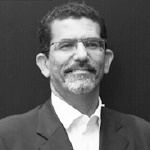Salim Ouertani, business unit manager at AbbVie Tunisia, has been with the affiliate since its beginning in Tunisia when it was spun-off from Abbott in 2013, being in charge of ensuring a smooth transition. Presently, AbbVie’s manager runs ethical operations and is looking forward to supporting more patients suffering from immunology diseases in Tunisia. Ouertani describes the role of AbbVie in the construction of a transparent and well-performing healthcare industry in Tunisia and supporting medical education.
You were appointed as Business Unit Manager for AbbVie Tunisia in 2013 as Abbott and AbbVie separated. What were your main priorities, how did they evolve and what challenges did you face?
AbbVie was created in 2013 as a spin-off from Abbott. I was the first manager to be appointed in Tunisia and the main task set for me was to ensure the continuity of operations in the country. I was previously working for Abbott international, when the companies split, I was charged of ensuring that the heritage and expertise of the operations now under the name of AbbVie would be available in Tunisia. AbbVie’s status was not easy to build up in this highly competitive environment. I had to draw on Abbott’s hundred-year heritage and experience to prove its spin-off’s ability to deliver highly focused innovative products to the market. I am looking forward to growing the affiliate and bringing new solution to our patients.
Research and innovation are the cornerstones of AbbVie’s business. In Tunisia, we are involved in pharmaceutical activities for the most part, focus on the discovery, development and delivery of drugs in medical areas for which needs remain unaddressed, mainly collaborating with peers, academics and experts as well as government agencies. Additionally, our corporate culture focused on ethics has led us to engage in CSR activities. As a matter of fact, as the vice-president of SEPHIRE, the Tunisian association for innovative companies in Tunisia, I have promoted the inclusion of an ethical chart which is now a part of the member’s compliance scheme.
What would you say is the role of the Tunisian affiliate regionally?
[Featured_in]
Our regional role has become increasingly important as a consequence of the post revolution context in Tunisia. Our goal is to build a model that can be replicated in other countries in the region and for this reason the head of medical research for Near East and Northern Africa leads the rollout of our projects from here. He is also collaborating with the clinical research manager of the region on a four-year horizon in the Middle East and Africa.
How have you seen the regulatory landscape in Tunisia evolve and where do you identify issues that still need to be tackled?
[related_story]
There used to be access problems in Tunisia, which have recently begun to be addressed through public private dialogues. As a result, of afore mentioned private public dialogues, appraisal times were significantly reduced and the decision process for pricing and reimbursement is about to be simplified. By clarifying who is responsible for defining the price of medication, the processes and efficiency will be consequently improved.
Which activities does AbbVie engage in Tunisia?
In Tunisia, we strive to be pioneer in the immunology field, but most importantly we want to play an active role in the development of Tunisia’s pharmaceutical sector. I am confident that, by targeting the needs of patients and operating responsibly in the country, we will manage to enhance access to healthcare and drive sustainable growth in the country.
What are the main growth drivers for AbbVie in Tunisia and how will you complement the existing portfolio?
Our products are highly focused and research-driven biotechnology therapies targeted life-threatening chronic diseases such as immunology, oncology, rheumatology and gastroenterology. We also operate in anesthesiology. We need to ensure our products are available for Tunisian patients. It is essential that our highly innovative products are always reliable, their quality cannot be doubted and we do no mistakes can be allowed with lives at stake.
AbbVie’s pipeline includes over 20 new molecules, which our headquarters are aiming to launch by 2022. In the case of Tunisia, we are looking at a variety of products in immunology as well as hepatitis C, and are currently working on a way to bring new solutions. It has been a recurring challenge for us to see our products registered in Tunisia. However, we are still dedicated to bring innovation to the market and will support the ambitious National program of education to healthcare professionals.
What makes AbbVie such a great place to work?
Active people spend more time at work than they do at home and therefore it is important the professional environment they work in is enjoyable. AbbVie’s initiatives to maximize employee happiness have given way to gains in productivity. We consider the personal growth of employees our responsibility and offer training session so they build relevant skills to perform within the market and feel a sense of accomplishment. Also, the company has implemented flexible working practices. For example, our employees can work from home and choose their working hours to a certain extent. As a result, our employees deliver work of better quality Our special pride was to be awarded the title of Top Employer in Africa and, also as AbbVie Tunisia, the award of recognition for the quality of our Human Resource Management by the worldwide headquarters of AbbVie, as we won the presidential award and vice-presidential award twice each.







